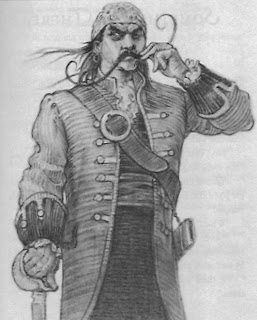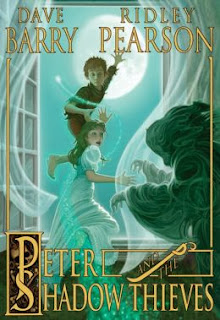J.M. Barrie devotes little of his book to physical description of Captain Hook's scaled nemesis, although in stage directions for his 1904 play, he provides the memorable stage direction: "A huge crocodile, of one thought compact, passes across, ticking, and oozes after them." He tells us in the book that the creature is female, although Hook refers to the beast as "it" (an omission for which Vivian takes him to task in The Stowaway). In the 1953 animated Disney film, the croc is male and named Tick Tock. In Peter and the Starcatchers, and the play derived from the book, the crocodile is again male and known by the moniker Mr. Grin.
In Barrie's wake, many writers and filmmakers have given the crocodile additional metaphoric weight. It is easy enough to see her as the personification (reptile-ification?) of death. As the character of Mrs. Snow says in the film Finding Neverland, in a quote often misattributed to the author rather than the character played by Johnny Depp, "I suppose it's like the ticking crocodile, isn't it? Time is chasing after all of us, isn't that right?"
And yet Disney studios gave us a, well, goofy croc. Not only am I not threatened by Tick Tock, I actively feel sorry for him. I accept the reasoning behind making the movie less frightening for young children, but I'm embarrassed on behalf of the cartoon Hook, as being afraid of this animal just makes him look more ridiculous. Surely the poor crocodile deserves better as well.
The 2003 live action movie went the entirely different direction with its menacing, dinosaur-esque crocodile.
And we've lost all pretense to realism in the stage productions of Peter and the Starcatcher, but I admit to being particularly impressed with the use of minimal props to portray an alarming Mr. Grin.
In The Stowaway, we learn that the story Peter Pan told Mr. Barrie--that he cut off Hook's hand and threw it to the crocodile, leading the beast to stalk the pirate incessantly in hopes of getting the rest of him--may not be entirely correct in all its particulars. But that does not mean the crocodile isn't a deadly creature and frightening enough in its own right. As I write this, I see that only a day ago, the remains of a man were found in the belly of a saltwater crocodile in Australia, in the same region where another crocodile killed a 12-year-old boy in January. The croc in The Stowaway has metaphorical significance, as may be unavoidable after so many years and retellings, but I hope not to be heavy-handed about it. The real physical threat posed by a crocodile is already substantial enough.















